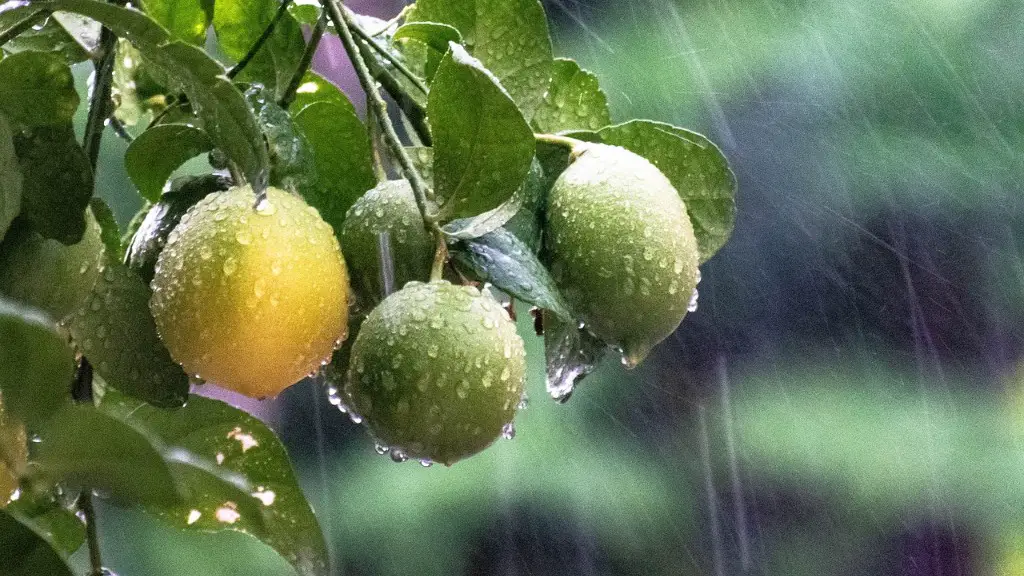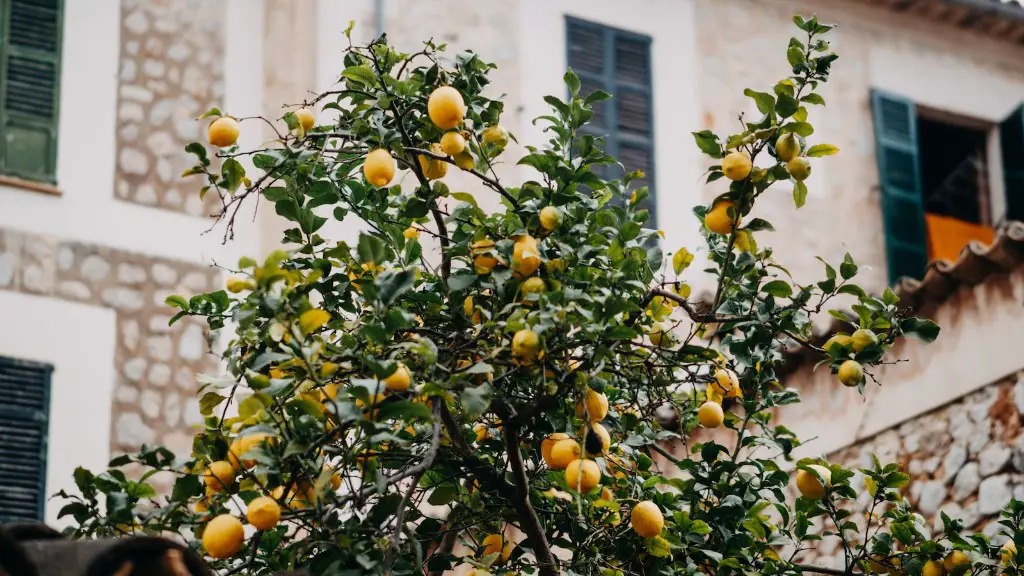The Lemon Tree is one of the most popular and productive citrus trees, but many don’t know just how long it can live. In fact, with proper care, a Lemon Tree can live for many years – sometimes even decades. Lemon Trees typically reach their full-size within three years and can live for up to 25 years, although 20 years is the average. This tree is hardy and has impressive tolerance for the variable Mediterranean climate, and many old Lemon Trees have been known to remain productive for up to 50 years.
Lemon Trees need an ample amount of sunlight and water to thrive, but otherwise require minimal maintenance for maximum lifespan. For best growth, the tree should get at least 8 hours of direct sun per day and be watered frequently, but very shallowly. The soil should also be kept loose and well-draining to prevent rot and drain away excess water. Pruning should also be done regularly to maintain the tree’s shape, induce branching, and prevent fruit overcrowding. Regular fertilization is also important to provide the tree with the nutrients it needs to stay healthy.
The life expectancy of a Lemon Tree depends on its environment, maintenance level, and overall health. A well-cared-for Lemon Tree can easily reach 30 to 45 years of age, while in more favorable climates, some trees have been known to live for nearly 100 years. Neglect, however, can easily cut the life expectancy of a Lemon Tree to less than 10 years. Lemon Trees are highly susceptible to pests, diseases, and nutrient deficiencies, so it’s important to take proper care of your tree to ensure it lives as long as possible.
Location Factors
The location of a Lemon Tree can have a big impact on how well it grows and how long it lives. Lemon Trees do best in warm, humid climates, as temperatures below 15°C can damage or even kill the tree. If Temperatures drop too low, citrus trees can suffer freeze damage, so mulching in winter is advised to keep roots insulated. Lemon Trees also need protection from the wind, as windy locations can cause excessive water loss.
If growing a Lemon Tree in a pot, the pot should be large enough to allowed the roots to expand, as this will ensure more vigorous growth and extended lifespan. The potting soil should also be kept constantly moist and fertilized regularly with a balanced nitrate fertilizer. Moving pots inside during cold months is also advised to protect the tree from extreme temperatures.
Overall, with proper location and the right care, a Lemon Tree can easily live for a decade or two. However, the results will depend on climate, soil type, and growing conditions, so paying close attention to your tree’s needs is essential for its long-term health.
Grafting
Grafting is a propagation method for Lemon Trees that can result in improved fruit-bearing and longer lifespans. It is a process that combines the bottom portion of a seedling, or a rootstock, with the top of an established tree or cutting. This method is used to create disease-resistant hybrids, improve hardiness and yield, or impart certain desirable characteristics. Grafted Lemon Trees can live longer because they are naturally more resistant to diseases and more tolerant of extreme temperature changes.
In many cases, rootstocks can even increase the longevity of Lemon Trees. For instance, a mandarin rootstock can increase the lifespan of a Lemon Tree to around 45 years. It is important to note, however, that choosing the right rootstock is essential for healthier growth, yield, and longevity, as incorrect selection can weaken the plant or make it more susceptible to disease.
Grafting is not the only way to increase the life expectancy of a Lemon Tree, but it can play a key role. When done correctly, grafting can prevent diseases, improve yield, strengthen the root system, and even increase the lifespan of a Lemon Tree. It’s a great way to get more out of your lemon tree without having to replant and start over.
Other Benefits
Lemon Trees offer many other benefits in addition to a long lifespan. In addition to the fresh, juicy fruits they produce, they also provide a delightful aroma and vibrant greenery to any outdoor space. The trees can even act as a natural air freshener, as the citrus scents can help mask unpleasant odors in the environment. Lemon Trees can also provide a great source of yard security, as the sharp spines on their branches can ward away intruders.
Lemon Trees are also great for attracting wildlife. In particular, the fruits of the Lemon Tree can provide a welcome food source for birds, bees, and other animals. The flowers of the tree can also attract pollinators, helping to increase the local biodiversity in the area. Furthermore, the tree’s fragrant oils and nectars are highly desirable to many types of insects, which can be an important part of the local food chain.
Aside from their value as food sources, Lemon Trees also offer many health benefits. The fruits contain a range of antioxidants, vitamins, and minerals, making them a great addition to any healthy diet. In addition, many folk remedies are based on the properties of Lemon Trees, such as using the leaves to reduce fever or to make a soothing tea. The leaves and fruits of the tree can also be used in natural skincare and hair care routines due to their anti-inflammatory and antimicrobial properties.
Care
Regular maintenance is essential for a Lemon Tree to remain healthy and productive. Watering the plant at least twice per week is important to keep its leaves and fruits from drying out. The soil should also be allowed to dry between waterings to prevent root rot. Additionally, the Lemon Tree should receive an adequate amount of fertilizer to promote healthy growth and better yields.
Pruning should also be done regularly to maintain the tree’s shape, remove old or overcrowded branches, and encourage new fruiting. Pruning is best done with calm, dry weather and pruning shears, as using other sharp objects may contaminate the tree. Additionally, pruning should always be done in moderation and with careful removal of outgrowth, as over-pruning can limit the tree’s ability to bear fruits.
In overall, a Lemon Tree can live for many years, but it is important to follow the right maintenance steps to ensure a longer lifespan. Proper irrigation, pruning, and fertilization can help Lemon Trees reach their full productivity and extend their longevity. Additionally, protecting the tree from extreme temperatures, pests, and diseases can help to keep it happy and productive for many years to come.



